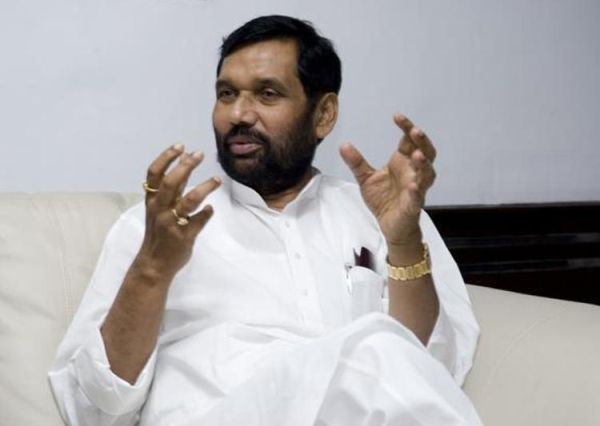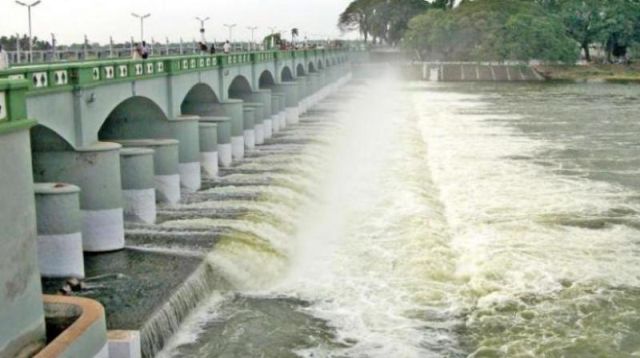
by Editor | May 25, 2021 | Employment, Government Jobs, News, Politics

Ram Vilas Paswan
New Delhi : Union Minister Ram Vilas Paswan on Wednesday said reservation in promotion for Scheduled Castes (SC) and Scheduled Tribes (ST) will continue at both at the Centre and in the states and directives in this regard will be issued soon.
“There was confusion over whether the Supreme Court’s order was applicable for just Central government employees or for state government employees. In our meeting of ministers, it was cleared that the reservation is for both Central and state government employees,” Paswan told reporters after attending the meeting chaired by Home Minister Rajnath Singh.
The apex court had said last week that the government was not debarred from making promotions in accordance with law, subject to further orders.
On June 5, the Supreme Court permitted the Central government to go ahead with reservation in promotions to certain categories of staff in accordance with law but did not stay a Delhi High Court judgment that quashed an office memorandum on such reservations.
Paswan said the quota in promotion was halted on account of the judgements passed by different high courts in the country.
The minister also said the government was ready with an ordinance to overturn the Supreme Court’s March 20 order that puts safeguards against arrests under SC/ST (Prevention of Atrocities) Act but it would wait for the court’s final decision on the review petitions.
He also said the University Grant Commission (UGC) will also soon withdraw its order affecting reservation soon.
Paswan also reiterated his demand of reservation for those preferring inter-caste marriages.
—IANS

by Editor | May 25, 2021 | News, Politics
 New Delhi : Rebel JD-U leader Sharad Yadav will continue to occupy his official accommodation here as the Supreme Court on Thursday refused to interfere with a Delhi High Court order allowing him to retain the official bungalow on Tughlaq Road here.
New Delhi : Rebel JD-U leader Sharad Yadav will continue to occupy his official accommodation here as the Supreme Court on Thursday refused to interfere with a Delhi High Court order allowing him to retain the official bungalow on Tughlaq Road here.
Permitting him to stay in the official accommodation, the vacation bench of Justice Adarsh Kumar Goel and Justice Ashok Bhushan took on record the statement by senior counsel Guru Krishna Kumar that Sharad Yadav won’t draw any allowances till the matter was decided by the High Court.
The top court also said that the division bench of the High Court will decided the issue, listed for hearing on July 12.
The court said this as senior counsel Ranjit Kumar, appearing for Janata Dal-United Rajya Sabha member Ram Chandra Prasad Singh, said that due to the pendency of the matter, the election to fill two vacancies caused by the disqualification of Sharad Yadav and Ali Anwar was not taking place.
The High Court while refusing to interfere with his disqualification by Rajya Sabha Chairman M. Venkaiah Naidu as JD-U member of the Upper House had by an interim order allowed him to continue to stay in the official residence until his plea against his disqualification was decided.
The High Court had also allowed Yadav to draw allowances and perquisites.
Thursday’s order came on a petition by JD-U’s Rajya Sabha member Ram Chandra Prasad Singh, who challenged the Delhi High Court order.
Sharad Yadav and Ali Anwar were disqualified as Rajya Sabha members after they rebelled against Bihar Chief Minister Nitish Kumar’s decision to join hands with the BJP-led NDA after snapping ties with the Rashtriya Janata Dal and the Congress.
—IANS

by Editor | May 25, 2021 | News, Politics
 New Delhi : Amid high political drama, the Supreme Court early on Thursday didn’t stop B.S. Yeddyurappa from taking oath as Karnataka’s new Chief Minister but the legal battle for the BJP leader and his party is far from over.
New Delhi : Amid high political drama, the Supreme Court early on Thursday didn’t stop B.S. Yeddyurappa from taking oath as Karnataka’s new Chief Minister but the legal battle for the BJP leader and his party is far from over.
After a rare midnight hearing that ran for hours, the court refused to stay the oath taking ceremony as was sought in a joint petition by the Congress and the Janata Dal-Secular (JD-S).
“In case he is given oath in the meantime, that shall be subject to further orders of this Court and final outcome of the writ petition (by the Congress and JD-S),” said the three-judge bench, recording the proceedings of the night in the packed Room No.6.
Presiding the proceedings were Justices A.K. Sikri, S.A. Bobde and Ashok Bhushan.
Yeddyruppa took oath as planned but on Friday at 10.30 a.m. when the apex court hears the matter again, he will have to produce the two letters dated May 15 and 16 he has written to Governor Vajubhai Vala to stake his claim for government formation.
The BJP leader is said to have claimed a majority support in the letters.
But the question is how?
The Congress and JD-S had challenged Karnataka Governor Vala’s invitation to Yeddyurappa to form the government despite the BJP falling short of legislative numbers to claim majority in the 222-member Assembly. Voting was not held in two of the 224 constituencies on May 12.
The BJP won 104, the Congress 78 and the JD-S 37. Any party or grouping needs 112 members to claim majority as per the present strength of the House. The Congress and JD-S didn’t have a pre-poll alliance but cobbled together a grouping after the results threw a hung Assembly.
Together, and with a support of one BSP member and an independent, the Congress and JD-S make 117.
The Governor still invited Yeddyurappa and gave him 15 days of time to prove majority.
The Congress lashed out at the Governor’s move calling it “partisan and biased” and rushed to the Supreme Court for an urgent hearing that commenced at 2.20 a.m. and concluded at 5.30 in the morning.
During the hearing, senior counsel Abhishek Manu Singhvi, appearing for the Congress, argued that the Governor must have invited the post-poll coalition to form government as no single party secured majority.
He questioned the 15-day time given to Yeddyurappa for proving majority, saying the Supreme Court had earlier said that “to give such time is to encourage the constitutional sin of poaching”.
In his argument that ran for more than an hour, Singhvi also cited instances of Meghalaya, Manipur, Goa, Delhi, Jharkhand and Jammu and Kashmir as precedents of post-poll alliances being invited to form governments.
“There is only one way a party which got 104 will get 113… I heard he asked for seven days (time to prove majority) but the Governor gave 15. Elementary common sense and arithmetic go against this kind of giving of time,” Singhvi said. “Question is whether it is valid, fair or capricious.”
Attorney General K.K. Venugopal, appearing for the Centre, said everything was in the realm of “speculation” as the entire matter was still “a grey area”.
Former Attorney General Mukul Rohatgi, who appeared for the BJP, questioned the urgency of the matter to hear it at midnight as if “heavens will fall if a person is sworn in the morning”.
Justice Sikri asked him on what basis was his side claiming majority in the House. “It is not a fluid situation. In view of this arithmetic, on what basis you claim majority.”
Venugopal intervened: “Everything is reversible. What is the great loss by waiting for 15 days?”
Justice Bobde countered: “That is the other point. Why wait for 15 days?”
Venugopal said it was the Governor’s decision.
The court observed that it was “preposterous” to argue that before MLAs take oath they were not amenable to anti-defection law.
“It means open invitation to horse-trading. It is preposterous (to argue) that before he (an elected MLA) takes oath as member all this (floor crossing) is allowed,” Justice Sikri told the Attorney General.
“In a case like this where the opposite side is showing 117 MLAs support, how you will have 112,” Justice Sikri asked, adjourning the hearing till Friday morning.
—IANS

by Editor | May 25, 2021 | Corporate, Corporate Governance, News, Politics
 New Delhi : The Supreme Court on Monday sought Tamil Nadu, Karnataka, Kerala and Puducherry’s response to the scheme formulated by the Central government for the implementation of 2007 Cauvery Water Tribunal award which was marginally modified and reaffirmed by the top court in February 2018.
New Delhi : The Supreme Court on Monday sought Tamil Nadu, Karnataka, Kerala and Puducherry’s response to the scheme formulated by the Central government for the implementation of 2007 Cauvery Water Tribunal award which was marginally modified and reaffirmed by the top court in February 2018.
A bench of Chief Justice Dipak Misra, Justice A.M. Khanwilkar and Justice D.Y. Chandrachud sought the response from the beneficiary states as Attorney General K.K. Venugopal said there were two areas where the Centre wanted the court’s intervention.
Venugopal also said there was some dispute among the four states, and under the scheme there would be some authority and its nomenclature — whether it would be a Board, Authority or an entity — had not been decided.
At the outset of the hearing, the court recorded the presence of Water Resources Secretary U.P. Singh as he was directed in the last hearing to be personally present in the court.
The court directed the next hearing on Wednesday when in the light of the states’ response it will examine the scheme.
Despite prodding by the apex court, the centre delayed its response till after Assembly elections in Karnataka.
—IANS

by Editor | May 25, 2021 | News, Politics
 New Delhi : The Supreme Court on Monday described as “unconstitutional” and set aside a provision of a law that allowed government accommodations to former Uttar Pradesh Chief Ministers.
New Delhi : The Supreme Court on Monday described as “unconstitutional” and set aside a provision of a law that allowed government accommodations to former Uttar Pradesh Chief Ministers.
A bench headed by Justice Ranjan Gogoi said once a Chief Minister demits office, there was nothing to distinguish him or her from a common man.
Setting aside the provision of the law passed by the Uttar Pradesh Assembly, the court said it was “arbitrary”, “discriminatory” and “unconstitutional”.
The amendments made in Salaries, Allowances and Miscellaneous Provisions Act were introduced by then Uttar Pradesh Chief Minister Akhilesh Yadav’s government in 2016.
The top court order came on a plea by NGO Lok Prahari.
—IANS





